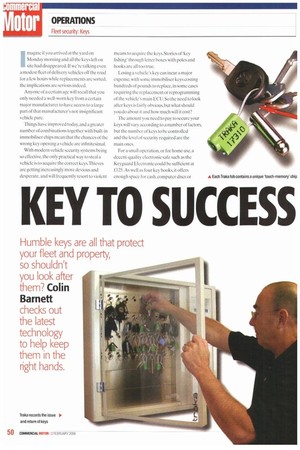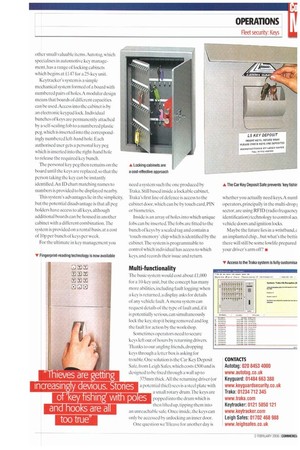KEY TO SUCCESS
Page 50

Page 51

If you've noticed an error in this article please click here to report it so we can fix it.
Humble keys are all that protect your fleet and property, so shouldn't you look after
them? Cohn
Barnett checKs out the latest technology to help keep them in the right hands.
Imagine if you arrived at the yard on Monday morning and all the keys left on site had disappeared. If we're talking even a modest fleet of delivery vehicles off the road for a kw hours while replacements are sorted. the implications are serious indeed.
Anyone of a certain age will recall that you only needed a well-worn key from a certain major manufacturer to have access to a large part of that manufacturer's not-insignificant vehicle pare.
Things have improved today, and a greater number of combinations together with built-in immobiliser chips mean that the chances of the wrong key opening a vehicle are infinitesimal.
With modern vehicle security systems being so effective, the only practical way to steal a vehicle is to acquire the correct keys.Thieves are getting increasingly more devious and desperate, and will frequently resort to violent means to acquire the keys Stories of' key fishing through letter boxes with poles and hooks are all too true.
Losing a vehicle's key can incur a major expense, with some immobiliser keys costing hundreds of pounds to replace, in some cases requiring the replacement or reprogramming of the vehicle's main ECU. So the need to look after keys is fairly obvious, but what should you do about it and how much will it cost?
'Me amount vou need to pay to secure your keys will vary according to a number of factors, but the number of keys to he controlled and the level of security required are the main ones For a small operat ion, or for home use, a decent-quality electronic safe such as the Keyguard Electronic could he sufficient at £125. As well as four key hooks, it offers enough space for cash, computer discs or
other small valuable items.Autotag, which specialises in automotive key manage em, has a range of locking cabinets which begins at £1.47 for a 25-key unit.
Keytracker's system is a simple mechanical system formed of a board with numbered pairs of holes. A modular design means that boards of different capacities can be used.Access into the cabinet is by an electronic keypad lock. Individual bunches of keys are permanently attached by a self-sealing fob to a numbered plastic peg, which is inserted into the correspondingly numbered left-hand hole. Each authorised user gets a personal key peg which is inserted into the right-hand hole to release the required key bunch.
The personal key peg then remains on the board until the keys are replaced, so that the person taking the key can he instantly identified.An ID chart matching names to numbers is provided to be displayed nearby.
This system's advantages lie in the simplici but the potential disadvantage is that all peg holders have access to all keys. although additional boards can be housed in another cabinet with a different combination. The system is provided on a rental basis, at a cost of 10p per bunch of keys per week.
For the ultimate in key management you need a system such the one produced by Traka. Still based inside a lockable cabinet.
ty, Traka's first line of defence is access to the cabinet door, which can be by touch card. PIN or biometrics.
Inside is an array of holes into which unique fobs can he inserted.The fobs are fitted to the bunch of keys by a sealed tag and contain a 'touch-memory' chip which is identified by the cabinet:The system is programmable to control which individual has access to which keys, and records their issue and return.
Multi-functionality
The basic system would cost about £1,000 bra 10-key unit. hut the concept has many more abilities, including fault logging: when a key is returned, a display asks for details of any vehicle fault.A menu system can request details of the type of fault and, if it is potentially serious, can simultaneously lock the key, stop it being removed and log the fault for action by the workshop.
Sometimes operators need to secure keys left out of hours by returning drivers. Thanks to our angling friends, dropping keys through a letter box is asking for trouble. One solution is the Car Key Deposit Safe, from Leigh Safes, which costs £500 and is designed to be used through a wall up to 375mm thick. All the returning driver (or a potential thief) sees is a steel plate with a small rotary drum.The keys are popped into the drum which is then lifted up. tipping them into an unreachable safe. Once inside, the keys can only be accessed by unlocking an inner door.
One question we'll leave for another day is whether you actually need keys.A numl operators, principally in the multi-drop sector. are using RR]) (radio frequenq, identification) technology to control acc vehicle doors and ignition locks.
Maybe the future lies in a wristband,c an implanted chip... but what's the bettit there will still be some lowlife prepared your driver's arm off?•




























































































































































































